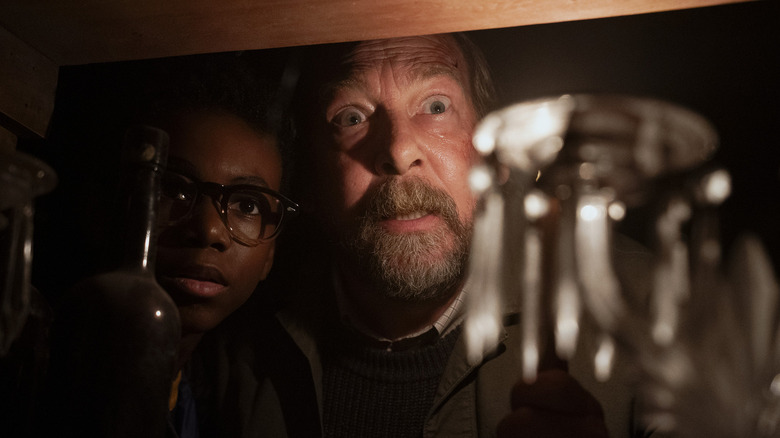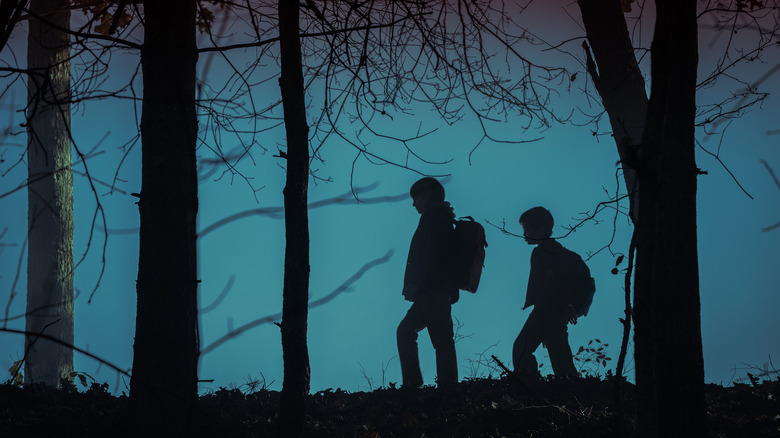Warner Bros.
The journey of Gary Dauberman’s “Salem’s Lot” to the screen has been far from smooth. This adaptation of the Stephen King novel was initially slated for a 2022 release. However, it was pushed back to 2023 before being removed from the release schedule entirely. As a Warner Bros. production, there were growing concerns that this vampire film might follow the fate of WB’s “Batgirl” and “Coyote vs. Acme” and never see the light of day. King himself voiced his confusion on Twitter, questioning why the studio was holding back the film. “Not sure why WB is holding it back; not like it’s embarrassing, or anything,” the horror maestro stated. It was later rumored that “Salem’s Lot” might bypass theaters altogether and debut directly on WB’s streaming service, Max. The studio confirmed this, announcing that “Salem’s Lot” would premiere on Max in October, just in time for the Halloween season.
Movie delays often come with their share of baggage. They can suggest a lack of confidence from the studio in the finished product, raising some eyebrows. But delays aren’t always a harbinger of doom. Drew Goddard’s horror-comedy “The Cabin in the Woods” was famously delayed for years before it was finally released and embraced by horror fans. Similarly, Michael Dougherty’s Halloween anthology “Trick ‘r Treat” sat on a shelf for two years before being released directly to DVD and becoming a modern spooky season favorite.
With Dauberman’s “Salem’s Lot” now finally available, one question arises: was it worth the wait? As a die-hard Stephen King fan and an admirer of Dauberman’s work (his haunted house movie “Annabelle Comes Home” is my personal favorite in The Conjuring Universe), it pains me to admit that this new rendition of “Salem’s Lot” lacks bite. I’m not suggesting it should’ve remained shelved indefinitely — such a move would be dreadful and misguided. However, this adaptation of King’s vampire classic feels hasty, awkward, and oddly lifeless. King hit the nail on the head: It’s not “embarrassing, or anything.” It’s just not very good. Bummer.
Salem’s Lot feels rushed

Warner Bros.
“Salem’s Lot,” King’s second published novel, is a fusion of Bram Stoker’s “Dracula” and Grace Metalious’ “Peyton Place.” It narrates the tale of a small New England town overrun by vampires. The story has been adapted twice before, first as a cherished 1979 miniseries directed by “Texas Chain Saw Massacre” genius Tobe Hooper, and then as a less-favored 2004 miniseries for TNT. Both adaptations were miniseries, allowing for a more leisurely pace and the incorporation of much of King’s text (though changes were made in both cases). Dauberman’s version is the first feature film adaptation of the material, necessitating significant cuts to fit the story into a 113-minute runtime. Unfortunately, this detracts from the movie, as the final product feels incomplete. King’s book excels at making Salem’s Lot feel like a real town populated by a diverse cast of characters. In Dauberman’s film, Salem’s Lot feels practically deserted even before the vampires arrive. The characters here leave little impression, as their backstories have been largely cut for a faster narrative.
Set in the ’70s, “Salem’s Lot” kicks off when author Ben Mears (Lewis Pullman) returns to his old hometown of Jerusalem’s Lot in Maine. He’s there to pen a book about his past. But Ben isn’t the only new face in town: a mysterious man named Barlow has bought the Marsten House, a creepy old mansion perched on a hill overlooking the town. Barlow intends to open a new antique store with his business partner, Straker (Pilou Asbæk). But if you’re not familiar with King’s book, you might miss much of this information as it’s conveyed through hastily delivered exposition. It’s as if the film is uninterested in setting up the story and just wants to rush to the vampire action.
Indeed, Barlow is a vampire, and Straker is his human servant. Soon enough, several residents of Salem’s Lot are found dead, their bodies drained of blood. The first to suspect a supernatural cause is Matt Burke (Bill Camp, always a welcome presence), a school teacher unafraid to utter the “v” word. Eventually, Matt, Ben, local girl Susan Norton (Makenzie Leigh), horror-obsessed kid Mark Petrie (Jordan Preston Carter), alcoholic priest Father Callahan (John Benjamin Hickey), and the somewhat skeptical Dr. Cody (Alfre Woodard) band together to form an impromptu vampire hunting squad. Why? Because the film requires them to. King’s book does a far superior job of maneuvering these characters into place, but Dauberman’s film doesn’t have time for such subtleties — it just charges forward clumsily, hoping we’ll tag along for the ride.
Salem’s Lot deserved to be released, but…

Warner Bros.
The film’s hurried pace might have been forgivable if there were other redeeming qualities, but “Salem’s Lot” consistently falls short. Pullman’s Ben is a remarkably dull protagonist (Who is he? What does he want? The movie doesn’t bother to explore!), and the supporting cast, save for Woodard’s refreshingly straightforward doctor, doesn’t fare much better. Pilou Asbæk’s Straker bellows his way through his limited scenes, and Alexander Ward’s Barlow, despite being the film’s main antagonist, never comes across as particularly menacing or intriguing. He’s not very frightening either, which seems like a crucial misstep.
The lack of character development is a significant issue for a Stephen King adaptation, as King’s greatest strength as a writer isn’t the terror he generates — it’s his characters. King has a unique talent for crafting characters and making us understand who they are almost instantly, thereby heightening the horror. When we become invested in a character, we care about their fate. If we grow to like a character, we don’t want them to be harmed — so when they inevitably are, our fears escalate. But all the characters in this version of “Salem’s Lot” are paper thin.
Eventually, “Salem’s Lot” injects some life into its climax, unleashing monster chaos reminiscent of a far more enjoyable B-movie. A significant sequence set at a drive-in movie theater at sundown is admittedly entertaining and action-packed. Occasionally, Dauberman manages to create some memorable visuals, like when two young boys wander through the woods at dusk, or when a cross held by a character begins to glow white-hot in a dark room when vampires are near.
But why, oh why, did this film have to feel so uninspired? I’m not suggesting that the third adaptation of “Salem’s Lot” needed to be a groundbreaking masterpiece, but it didn’t have to be this lackluster either. Even if you’re not familiar with King’s novel and aren’t comparing it to the source material, this new “Salem’s Lot” will likely leave you feeling unsatisfied. I’m glad this movie finally saw the light of day… I just wish I enjoyed it more.
/Film Rating: 5 out of 10
“Salem’s Lot” will be available for streaming on Max starting October 3, 2024.
Credit: www.slashfilm.com


